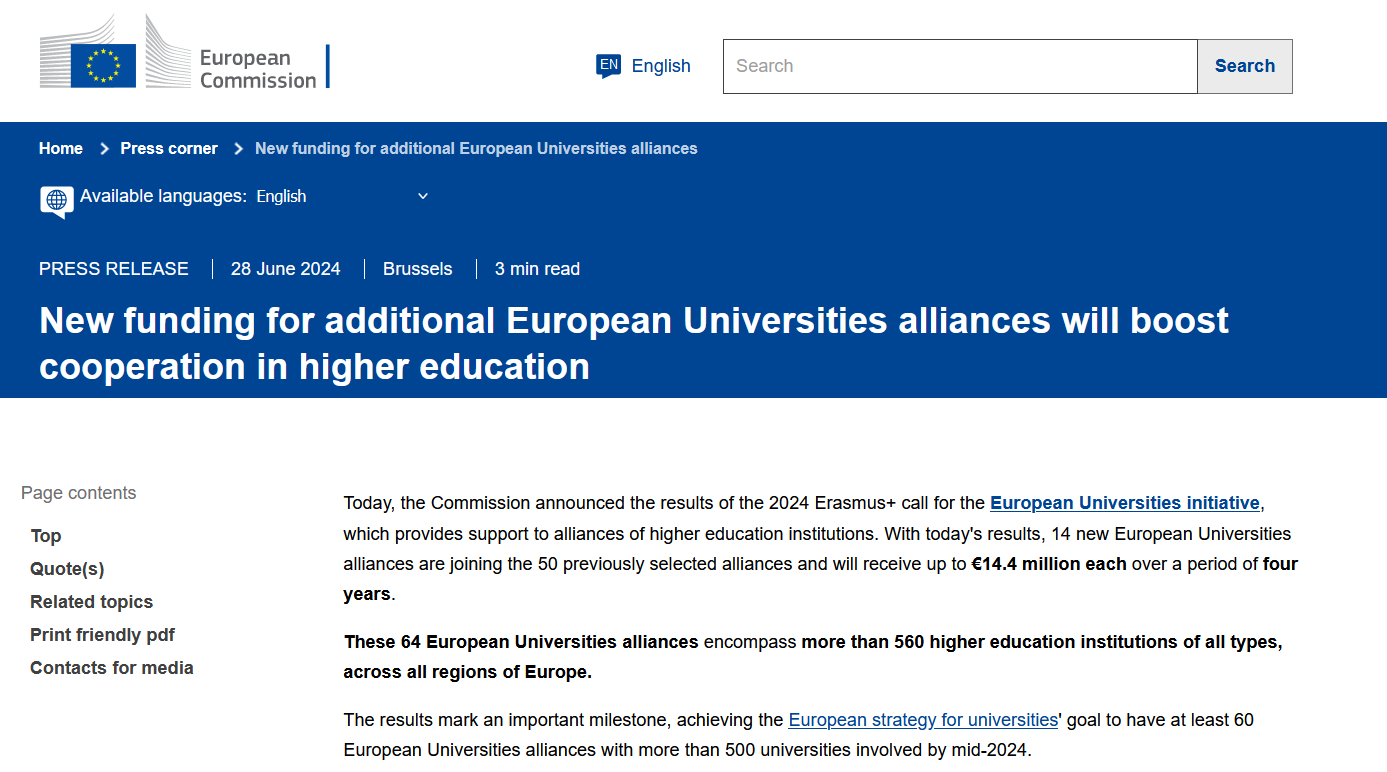European Universities alliances bring together a new generation of Europeans and allow them to study and work in different European countries, in different languages, and across sectors and academic disciplines. Students can obtain a high-level degree by combining studies in several European countries, contributing to the international attractiveness and competitiveness of Europe’s higher education. These alliances also bring innovation to Europe’s regions by allowing students to work together with academics, researchers, enterprises, cities, authorities, and civil society organisations.
The European Universities initiative supports transnational alliances of, on average, nine higher education institutions that can include different types of establishments, such as comprehensive and research universities, universities of applied sciences, institutes of technology, schools of arts and higher vocational education and training institutions. These higher education institutions develop a long-term structural, sustainable, and systemic cooperation on education, in synergy with research and innovation, across borders, and contribute to solving societal challenges. They offer curricula jointly delivered across inter-university campuses, on which students, staff, and researchers from all parts of Europe can enjoy seamless mobility.
On 28 June 2024, the Commission announced the results of the 2024 Erasmus+ call for the European Universities initiative, which provides support to alliances of higher education institutions. In fact, 14 new European Universities alliances are joining the 50 previously selected alliances and will receive up to €14.4 million each over a period of four years.
These 64 European Universities alliances encompass more than 560 higher education institutions of all types, across all regions of Europe. The results mark an important milestone, achieving the European strategy for universities’ goal to have at least 60 European Universities alliances with more than 500 universities involved by mid-2024.
The 64 alliances span 35 countries, including all EU Member States, as well as Albania, Bosnia and Herzegovina, Iceland, Montenegro, the Republic of North Macedonia, Norway, Serbia, and Türkiye. They are solidly anchored in communities and innovation networks, bringing together almost 2,200 associated partners ranging from non-governmental organisations to enterprises, cities, local and regional authorities, and higher education institutions from the Bologna Process countries. For example, almost 40 higher education institutions from Ukraine are associated partners.
Under the European Universities 2024 Erasmus+ Call, the following Alliances include partners from the Western Balkans:
- ACE2EU “Applied, Connected, Entrepreneurial and Engaged – European University” with REPUBLIC OF NORTH MACEDONIA STATE UNIVERSITY, STIP GOCE DELCEV , North Macedonia
- Across “European University for Cross-Border Knowledge Sharing” with UNIVERZITET U BANJOJ LUCI, Bosnia and Herzegovina
- BAUHAUS4EU “A European University for Resilient, Sustainable, Inclusive and Beautiful Regions” with UNIVERSITETI POLIS SHPK, Albania
- CHALLENGE.EU “Cultivating Holistic SustAinable CoLLaborations: ENGaging Excellence in European Universities” with SOUTH EAST EUROPEAN UNIVERSITY TETOVO, North Macedonia
- SUNRISE “Smaller (strategic) Universities Network for Regional Innovative and Sustainable Evolution” with UNIVERZITET DZEMAL BIJEDIC U MOSTARU, Bosnia and Herzegovina
- UNINOVIS “UNINOVIS DATA FOR L.I.F.E.” with UNIVERSITETI I TIRANES, Albania
The 14 new alliances of European Universities and the Community of Practice for European Universities will start their activities in autumn this year.
The Commission will continue supporting the European Universities alliances and any other type of partnership between higher education institutions to deliver joint degree programmes more easily, as also outlined in the blueprint for a European degree presented in March 2024.
The 2024 Erasmus+ call for proposals also supports the set-up of a Community of Practice for European Universities, reinforcing peer learning between the alliances and boosting dissemination of reusable results and models within the wider higher education sector.
For more information about this announcement, please refer to the source pages: https://ec.europa.eu/commission/presscorner/detail/en/IP_24_3542 and https://education.ec.europa.eu/sites/default/files/2024-06/results_2024_erasmusplus_european_universities_call_en.pdf

